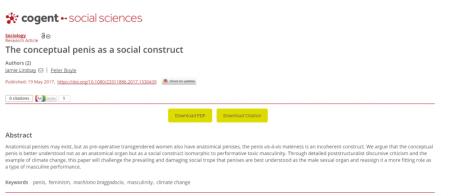Academic Journal Publishes Hoax 'Conceptual Penis' Study

Using pen names, two authors managed to publish a 3,000-word hoax paper in a peer-reviewed gender studies journal, Cogent Social Sciences. The paper talks about "conceptual penis," which the authors "argue," is behind many of the world's problems, including climate change.
The authors, "Jamie Lindsay" and "Peter Boyle," wrote a paper using words that were utter nonsense and titled, "The Conceptual Penis as a Social Construct," which "argues" that "the penis vis-à-vis maleness is an incoherent construct." And then they revealed it was a hoax paper by writing an article in the Skeptic magazine.
"We argue that the conceptual penis is better understood not as an anatomical organ but as a gender-performative, highly fluid social construct," the authors, who say their real identities are Portland State University philosophy professor Dr. Peter Boghossian and mathematician Dr. James Lindsay, wrote in the magazine. "This paper should never have been published."
It was written for the fictitious "Southeast Independent Social Research Group."
"The paper was ridiculous by intention, essentially arguing that penises shouldn't be thought of as male genital organs but as damaging social constructions," the authors wrote. "We made no attempt to find out what 'post-structuralist discursive gender theory' actually means. We assumed that if we were merely clear in our moral implications that maleness is intrinsically bad and that the penis is somehow at the root of it, we could get the paper published in a respectable journal."
They added, "After completing the paper, we read it carefully to ensure it didn't say anything meaningful, and as neither one of us could determine what it is actually about, we deemed it a success."
The paper's abstract reads: "Anatomical penises may exist, but as pre-operative transgendered women also have anatomical penises, the penis vis-à-vis maleness is an incoherent construct. We argue that the conceptual penis is better understood not as an anatomical organ but as a social construct isomorphic to performative toxic masculinity. Through detailed poststructuralist discursive criticism and the example of climate change, this paper will challenge the prevailing and damaging social trope that
penises are best understood as the male sexual organ and reassign it a more fitting role as a type of masculine performance."
And how did they seek to prove their "claim"?
Here's their "argument:" "Toxic hypermasculinity derives its significance directly from the conceptual penis and applies itself to supporting neocapitalist materialism, which is a fundamental driver of climate change, especially in the rampant use of carbon-emitting fossil fuel technologies and careless domination of virgin natural environments. We need not delve deeply into criticisms of dialectic objectivism, or their relationships with masculine tropes like the conceptual penis to make effective criticism of (exclusionary) dialectic objectivism. All perspectives matter."
The authors said in their magazine article, "No one knows what any of this means because it is complete nonsense. Anyone claiming to is pretending. Full stop."
In an interview published Monday at The College Fix, Boghossian said, "The academy is overrun by left-wing zealots preaching dangerous nonsense. Viewing the university as an ideology mill, these ideologues indoctrinated an entire generation of students into postmodernism and relativism."
He also compared social justice idealogues in academia to religious fundamentalists.
"Much like members of a zealous church or religious cult, argument and persuasion no longer work to convince many of these people. While an event like this will be unlikely to stop them, it can put a significant crack in the intellectual edifice they are using to protect and promote their ultimately morally motivated beliefs," Boghossian added.
The Cogent Social Sciences journal says on its website, "We believe in serving the needs of researchers so they are able to focus on making a difference through their research … We are a forward-thinking partner to the research communities, with journals across all areas of academia from education to engineering and medicine to mathematics. There is a journal in the Cogent Series for every researcher – come see for yourself."






















